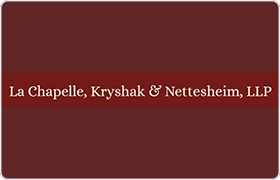 Rosholt Landlord-Tenant Lawyers, Wisconsin
Rosholt Landlord-Tenant Lawyers, Wisconsin
Sponsored Law Firm
-
 x
x

Click For More Info:
-
La Chapelle, Kryshak & Nettesheim, LLP
262 W Grand Ave Wisconsin Rapids WI 54495» view mapReal Estate Law Passionate and Dedicated Attorneys
The law firm of La Chapelle, Kryshak & Nettesheim, LLP, has provided legal services to the people of central Wisconsin for over a century.
800-886-1251
Not enough matches for Rosholt Landlord-Tenant lawyer.
Below are all Rosholt Real Estate lawyers.
Lawyers
1-2 of 2 matches



 Nicholas Abts Wisconsin Rapids, WI
Nicholas Abts Wisconsin Rapids, WI AboutLa Chapelle, Kryshak & Nettesheim, LLP
AboutLa Chapelle, Kryshak & Nettesheim, LLP Practice AreasExpertise
Practice AreasExpertise